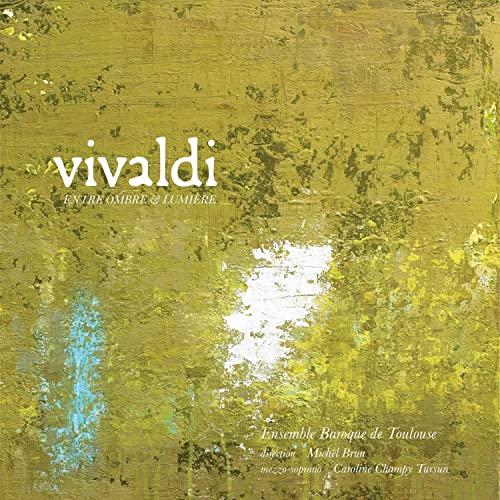Caroline Champy Tursun mezzo-soprano, Ensemble Baroque de Toulouse, Michel Brun
61:02
Click HERE to buy this on amazon.co.uk [digital only] – These sponsored links are the only way to support this FREE site.
This CD features Vivaldi’s Stabat Mater RV 621, sung by mezzo-soprano Caroline Champy Tursun, who also supplies a selection of arias from Bajazet, Giustino, Farnace and Orlando furioso, while the ensemble’s director appears as flute soloist in the flute Concerto Il Gardellino and the strings contribute the Sinfonia al Santo Sepolcro Rv 169. Recorded using a system called ECA in the Chapelle Notre-Dame-d’Alet, the performance is extraordinarily vivid – to my ear, unsettlingly so! As most of the orchestral playing is one-to-a-part and the default approach is distinctly ‘choppy’, I found the occasional legato sections, as in the slow movement of the flute concerto, a blessed relief, while much of Tursun’s singing was also pleasantly musical. The presentation of the package is distinctly odd – I still haven’t found a record label or a number, so have stated the group’s website in its place, although that doesn’t appear to be on the package either. The single CD is attached to the bottom of a box, which accommodates a huge folded sheet of programme notes, like a motoring map and for all its size only in French. Of course, this eccentric presentation need not put anyone off purchasing this CD, except that it is a reflection of the eccentricity of the performance, which seemed to go out of its way to distort Vivaldi’s music in a variety of ways. I have mentioned the persistent choppiness, and in the Sinfonia Al Santo Sepolcro a rather arch approach to the legato texture made this piece sound equally eccentric. Poor Vivaldi seems particularly open to ‘interpretation’, to the extent that it is quite unusual to hear his music given a good straightforward performance. It is probably true that Vivaldi is played too much, but rather than finding some new spurious approach to his music, why not turn to his less frequently played contemporaries? The present forces could easily have presented fine performances of these pieces, but seemed too intent upon being quirky.
D. James Ross
